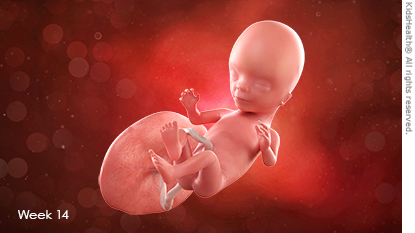- Home
- Humana Medicaid
- Kentucky Medicaid
- Medicaid extras
- Health and wellness
- Parents Home
- Para Padres
- A to Z Dictionary
- Allergy Center
- Asthma
- Cancer
- Diabetes
- Diseases & Conditions
- Doctors & Hospitals
- Emotions & Behavior
- First Aid & Safety
- Flu (Influenza)
- Food Allergies
- General Health
- Growth & Development
- Heart Health & Conditions
- Homework Help Center
- Infections
- Newborn Care
- Nutrition & Fitness
- Play & Learn
- Pregnancy Center
- Preventing Premature Birth
- Q&A
- School & Family Life
- Sports Medicine
- Teens Home
- Para Adolescentes
- Asthma
- Be Your Best Self
- Body & Skin Care
- Cancer
- Diabetes
- Diseases & Conditions
- Drugs & Alcohol
- Flu (Influenza)
- Homework Help
- Infections
- Managing Your Weight
- Medical Care 101
- Mental Health
- Nutrition & Fitness
- Q&A
- Safety & First Aid
- School, Jobs, & Friends
- Sexual Health
- Sports Medicine
- Stress & Coping
Pregnancy Calendar: Week 14
Your Baby's Development
By this week, some fine hairs have developed on your baby's face. This soft colorless hair is called lanugo, and it will eventually cover most of your baby's body until it's shed just before delivery.
Your baby's genitals have fully developed, though they may still be hard to see on an ultrasound. Your baby also starts to make thyroid hormones because the thyroid gland has matured.
Your baby now weighs about 1.6 ounces (45 grams) and is about 3.5 inches (9 cm) long from crown to rump.

Your Body
Your health care provider may discuss amniocentesis with you if you're older than 35 or if your screening tests indicated a possible problem with the fetus. Amniocentesis is a test usually done between 15 and 18 weeks that can detect abnormalities in a fetus, such as Down syndrome.
During this test, a very thin needle is inserted into the amniotic fluid surrounding the baby to take a sample of the fluid for analysis. Amniocentesis does carry a very slight risk of miscarriage, so talk to your health care provider about the risks and advantages of the test.

© 1995- The Nemours Foundation. KidsHealth® is a registered trademark of The Nemours Foundation. All rights reserved.
Images sourced by The Nemours Foundation and Getty Images.

